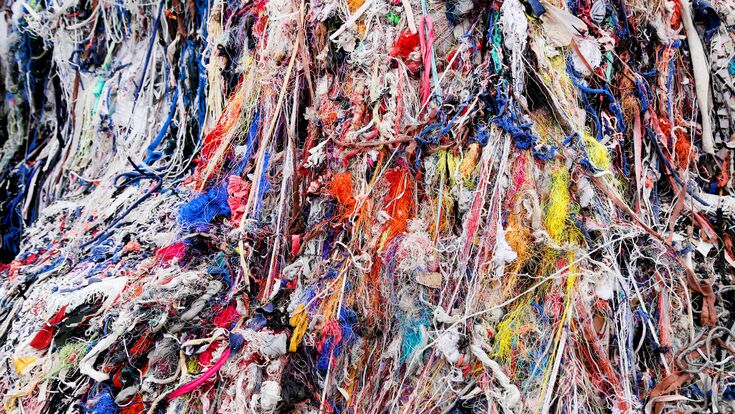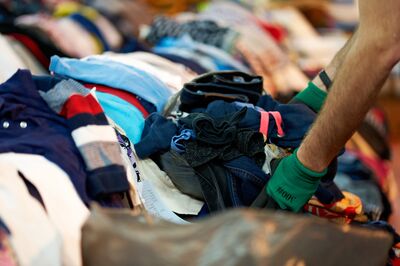Textile Waste : Fashion for Good and Textile Exchange join forces to track textile waste

Fashion for Good, a platform connecting innovators with fashion brands, and Textile Exchange, a global non-profit that focuses on minimizing the textile industries GHG emissions, have teamed up to launch the Tracing Textile Waste Project, a two-year initiative aimed at improving how data is collected and shared in the textile recycling process. The goal is to make things more efficient by creating an open-source data template and a glossary to standardize terms. This project will test and validate a framework to help collect and exchange data on textile waste, from where it originates to where it gets recycled. The idea is to provide recommendations for improving existing standards, like the Global Recycled Standard (GRS) and the Recycled Claim Standard (RCS).
Related article: Do a circular economy and fast fashion go together?
The need for better transparency in textile waste
One of the biggest hurdles in scaling textile recycling is the lack of clarity around where textile waste actually comes from. Currently, tracking textile waste is a very manual and scattered process. The data collected isn’t well-organized, making it hard to exchange or consolidate. But with increasing pressure from brands and new regulations, it’s clear that being able to trace the origins of recycled materials is more important than ever.
Fashion for Good and Textile Exchange are working together through the Tracing Textile Waste Project to tackle these issues, particularly when it comes to pre-consumer materials. By improving how waste data is classified and making systems work better together, the project hopes to strengthen data integrity. A key partner in this is Reverse Resources, a platform that connects textile waste with recyclers and helps digitize the process. This collaboration is expected to make waste tracking more efficient, improve supply chain transparency, and benefit everyone involved.
“We know there are various unlocks which are crucial on the path to scaling textile-to-textile recycled materials, and traceability is one of them. The quality and consistency of data is a challenge across the industry and particularly within traceability. Through this project, we can enhance and standardize the quality of data collected and hopefully accelerate the evolution of existing standards and certifications,” said Katrin Ley, Managing Director at Fashion for Good.
Related article: Bye bye bye: Europe's problem with used textiles exports
The quality and consistency of data is a challenge across the industry and particularly within traceability.Katrin Ley, Managing Director at Fashion for Good
Building on existing standards
When it comes to recycling in fashion, the Global Recycled Standard (GRS) and Recycled Claim Standard (RCS) are the key benchmarks. They help track the flow of certified textile waste between recyclers and other parts of the supply chain through a Chain of Custody system.
However, there’s currently limited visibility beyond the recycler, with most information shared through the Reclaimed Material Declaration Form (RMDF). This form lets sellers of recycled materials disclose product details, which are then periodically shared with certification bodies. The Tracing Textile Waste Project plans to expand on this by developing an open-source data standard, which will be tested with pre-consumer materials. The goal is to create a framework that can scale up and potentially be integrated into GRS/RCS standards and other recycling systems.
This new data template will be developed through consultations with brands, certification bodies, and other stakeholders to ensure it aligns with existing standards. The aim is to make the exchange of information more efficient and improve the certification process for recycled materials.

Regulatory drivers pushing forward
The Ecodesign for Sustainable Products Regulation (ESPR), set to take effect in July 2024, is part of a broader strategy to improve the circularity and sustainability of products sold in the EU. A major component of ESPR is pushing for more recycled content in products, which will boost demand for recycled textile materials.
As this regulation rolls out, companies will need to improve how they track and report on the recycled content of their products. Better data collection and standardisation, especially in the RMDF, will help brands comply with new regulations like the Digital Product Passport and Corporate Sustainability Reporting Directive. It will also play a big role in meeting the minimum recycled content requirements set out by ESPR.
As platforms for mapping textile waste become more common, they will help connect waste producers with potential buyers, making it easier for companies to find suitable recycled materials. Evonne Tan, Senior Director of Data & Technology at Textile Exchange, says, "Brands, and even consumers, are increasingly interested in knowing where their recycled products come from, including the sources of the materials being reused. Textile Exchange’s collaboration with Fashion for Good on this project aims to standardize and connect the data between the waste, certification, and traceability systems to achieve traceability of pre-consumer reclaimed materials."
Related article: The EU wants to fight the deluge of textile waste
This project is an important step towards a more transparent and sustainable fashion industry.Viviane Gut, Senior Director of Sustainability at adidas
What's next
Over the next two years, the Tracing Textile Waste Project will work to create a system for classifying and collecting data on textile waste, with the first output being a Minimum Viable Product (MVP) of the Reclaimed Material Declaration Form. Alongside this, a Glossary of Terms will be developed to define relevant waste-related terminology. The MVP will be tested through real-world use cases, including on Reverse Resources' platform.
The project will also explore ways to improve how data flows through the supply chain, with a focus on better API integration. The ultimate goal is to build a framework that can be scaled up and potentially integrated into GRS/RCS standards, as well as other recycling systems.
This initiative is led by Fashion for Good and Textile Exchange, with support from Control Union and brands like adidas, Target, Bestseller, Norrøna, and Levi Strauss & Co. The project also partners with key players in the ecosystem such as Reverse Resources, Recover, and Usha Yarns.
“This project is an important step towards a more transparent and sustainable fashion industry,” say the organizers. Viviane Gut, Senior Director of Sustainability at adidas, adds: “Partnering on the Tracing Textile Waste Project allows us to deepen our commitment to transparency and accountability in the supply chain. By piloting the traceability of textile waste in the adidas supply chain, we can ensure the integrity of recycled materials and drive meaningful change across the industry.”


